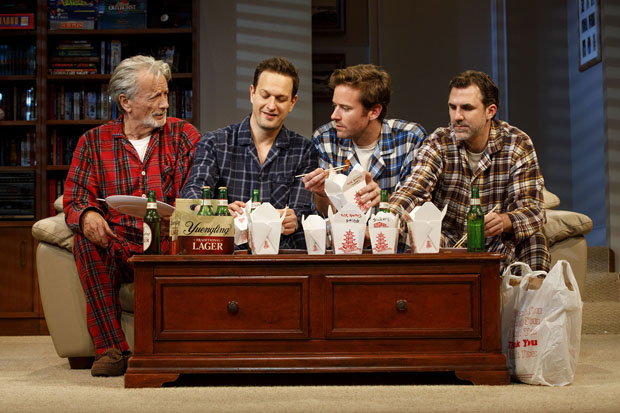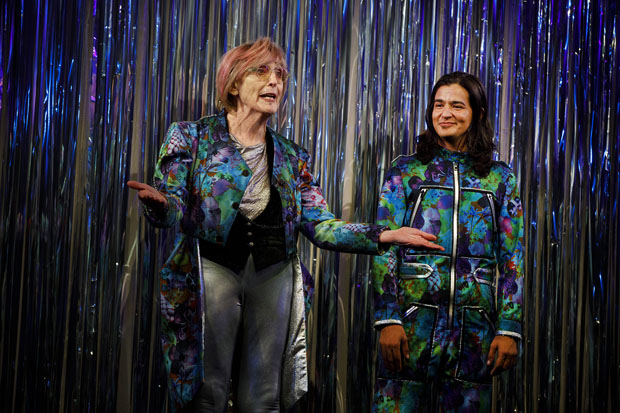What Is Wrong With Straight White Men?
An experimental playwright makes her Broadway debut with Second Stage Theater.

(© Joan Marcus)
Young Jean Lee has chosen a provocative title for her Broadway debut. Depending on the circles in which you travel, Straight White Men could be the description of the dominant power group in America; or it could be a besieged minority that is just now claiming its identity in a country all about identity politics. Either way, it's a dangerous combination of words from which to launch a Broadway debut — but Lee's work has never been safe.
The author of Untitled Feminist Show (a nude female ballet) and We're Gonna Die (a cabaret that told graying Lincoln Center subscribers just that) has never been constrained by conventional form or content. That may be why her decision to write a living-room drama about a bourgeois white family is the most unexpected career move of all.

(© Joan Marcus)
Straight White Men tells the story of Ed (a gruff Stephen Payne), a retired engineer and widower. He is hosting his unmarried professor son, Drew (Armie Hammer), and divorced banker son, Jake (Josh Charles), for Christmas. Ed already lives with his oldest (also unmarried) son, Matt (an inscrutable Paul Schneider). Matt is a graduate of Harvard and Stanford currently working a temp job at a community organization while helping dad with housework. His father and brothers wonder why. With his education, Matt should be the executive director of that organization. Why doesn't he seem to have any ambition? Drew thinks he's depressed, while Jake suspects he's taking a principled stand by not occupying a position that could go to a woman or minority. Ed thinks he's just too burdened by student loans. Matt sobs into his lo mein on Christmas Eve, but cannot seem to articulate what the problem is — if there even is one.
In my review of the play's 2014 off-Broadway run, I criticized its class blindness, suggesting it ought to be called Rich Straight White Men. So I approached this Broadway run from Second Stage Theater expecting Straight White Men to be a bitterer experience now that millions of poor straight white men in the Midwest, tired of hearing Ivy Leaguers harangue them about their privilege, opted to elect a champion in the form of President Donald Trump. And at first it is bitter, but this has more to do with the Broadway audience than Lee's play.

(© Joan Marcus)
Lee frames her white guy safari through two tour guides that directly address the audience and are definitely not straight white men: Trans performance artist Kate Bornstein and Native American lyricist Ty Defoe. "My gender identity is Niizhi Manitouwug," Defoe informs us, "which means 'transcending gender' in the Ojibwe language." The night I attended, this led some audience members to ululate as if they were attending a Bedouin wedding. I braced for an evening of Broadway ticket-holders congratulating themselves on their wokeness, but Lee is too clever to allow that: By the end of Straight White Men, we're left with a nagging feeling that we're all complicit in the story we have just witnessed.
Director Anna D. Shapiro's highly recognizable family dynamic and production is a huge part of that. Set designer Todd Rosenthal has crafted a typical suburban family room, overflowing with life and abundance. Charles, Hammer, and Schneider have real fraternal chemistry, roughhousing like overgrown teenagers while also (in a more adult fashion) exhibiting concern for one another as a way to deflect from their own failings. Dripping in smug superiority, Charles is particularly convincing as Jake, the banker bro who sings hosannas to Matt's martyrdom on the cross of social justice (conveniently allowing him to do nothing to make the world a better place).

(© Joan Marcus)
In a more religious era, Matt might have become the one son of a prosperous family led into the clergy (costume designer Suttirat Larlarb adorns him in baggy jeans and a form-swallowing sweatshirt, his modest postmodern robes). Matt insists that he just wants to be useful, but Ed rebukes, "What you're doing isn't actually useful. Especially considering everything that's been invested in you."
And there it is: Matt is an investment and after all the fancy schooling and important non-profit work, he hasn't produced a desirable return. This is the cold logic of capitalism applied to our children. The Costco-sized containers of junk food and laundry detergent that Rosenthal has prominently placed in the side pantry are just the least example of how such efficiency analysis has thoroughly infiltrated every aspect of bourgeois life in America.
So Straight White Men isn't as class-blind as I initially thought. Rather, it is a hard look at the underlying assumptions of the American upper-middle class that disproportionately makes up Broadway audiences. The play's title is still the theatrical equivalent of a reductive click-bait headline, but if viewers really watch and listen, even the queerest, brownest, and femalest audience members might find they have more in common with straight white men than they would care to admit.









